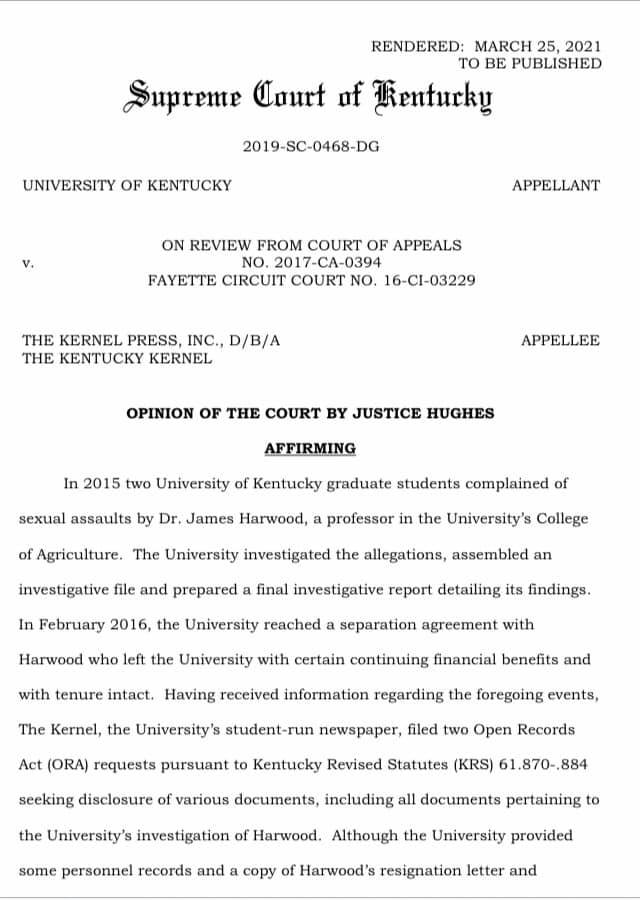

At last the Kentucky Supreme Court has issued an opinion ending the open records lawsuit that commenced in 2016 and pitted the University of Kentucky against its student newspaper, The Kentucky Kernel.
http://opinions.kycourts.net/sc/2019-SC-0468-DG.pdf
The opinion was well worth the wait.
In it, the Court sends a clear and unequivocal message to the University and all public agencies: "The public's right to know how effectively public institutions perform their taxpayer funded functions is unquestionably central to the Open Records Act."
Public agencies and institutions may find open records requests "burdensome and intrusive or even ill-advised" but they cannot wrap themselves in "invisibilty cloaks" to avoid disclosure of public records that expose inconvenient or embarrassing truths about their performance of these taxpayer funded functions.
The Court's holding may already be well-established, but clearly UK (and LMPD, KSP, and many others) require regular schooling in basic open records law.
Here are the top five takeaways from the Supreme Court's opinion in University of Kentucky v The Kentucky Kernel.
1. BOILERPLATE PUBLIC AGENCY RESPONSES TO RECORDS REQUESTS ARE "NOT HOW THE OPEN RECORDS PROCESS WORKS."
The Court harshly criticizes the University's boilerplate multi-exception response to The Kernel's request. The Court describes UK's "this [exception] but if not this [exception] then that [exception] used for every withheld document" response as "wholly unacceptable" and "wholly insufficient."
The Court reminds the University, in the strongest possible terms, that "for each document the University claims can be properly withheld from production pursuant to the ORA, the University has the burden to prove that the document fits within an exception by identifying the specific ORA exception and explaining how it applies. KRS 61.880."
This should be the death knell for perfunctory responses to open records requests such as those we have regularly seen by the Louisville Metro Police Department, the Kentucky State Police, and, yes, the University of Kentucky.
This "level of response" is the agency's statutory obligation "in the first instance" — i.e., in its initial response to the records request — and not just later on appeal.
THE TAKEWAY: Boilerplate public agency responses to open records requests violate the open records law under the statutory standard reaffirmed in UK v The Kernel.
2. REDACTION, NOT BLANKET DENIAL, IS REQUIRED BY LAW.
The Court parses each of the exceptions invoked by the University in responding to The Kernel's request, admonishing its default to blanket denial rather than redaction.
The Court first examines UK's invocation of the Family Educational Rights and Privacy Act. FERPA — the federal law regulating access to student education records — is deemed incorporated into Kentucky's open records law by KRS 61.878(1)(k), the open records "catch-all" exception that authorizes nondisclosure of records made confidential by federal law or regulation.
The Court characterizes as "patently unacceptable" UK's treatment of the 470 pages of disparate records responsive to The Kernel's request — including among other things, a camera manual — "as if it were one giant [FERPA protected] record . . . to avoid production."
Indeed, the Court notes, UofL, EKU, NKU, Morehead, and Murray released similar investigative files in 2016 with no adverse consequences.
Citing KRS 61.878(4) — the open records statute requiring public agencies to separate exempt material from non-exempt material and make non-exempt material available to the public — the Court declares that "the FERPA 'education records' exclusion was clearly not intended as an 'invisibility cloak' that can be used to shield any document that is involved or is associated in some way with a student."
"We are persuaded that 'education record' should be narrowly construed," the Court concludes, "and that *even those documents that qualify may still be subject to production in redacted form*."
The Court next examines UK's reliance on the student privacy as the basis for wholesale nondisclosure.
The "public interest in assessing the quality and thoroughness of a publc agency's performance of its duties is always strong," the Court observes. So, too, are the privacy interests of "victims of sexual assault at the hands of a public university professor."
"While this privacy interest must be recognized and protected, it cannot be the basis for wholesale shielding of public records."
The Court expressly declines to "say that disclosure of some or even all of the responsive records would 'constitute a clearly unwarranted invasion of personal privacy' because the privacy concerns presented by *disclosure can likely be resolved through careful redaction*."
THE TAKEAWAY: Kentucky's open records law demands redaction
rather than wholesale nondisclosure.
3. PRELIMINARY RECORDS FORFEIT PROTECTION WHEN THE AGENCY TAKES FINAL ACTION.
This interpretation of the preliminary documents exceptions has been engrained in open records laws since the early 1980's. The language of the exceptions that yields this longstanding interpretation, the Court pointedly notes, has not been amended by the General Assembly over time.
The Court rules that the University of Kentucky took final action when it ended its investigation into student complaints about a tenured professor's sexual assaults by accepting the professor's resignation and entering into a separation agreement — under terms, we are obliged to note, that were highly favorable to the offending professor.
"The effect of Harwood's resignation was to end the investigation and disciplinary proceedings; his resignation constitutes a final action. These parts of the Harwood Investigative File that were once preliminary in nature lost that exempt status when the University agreed to end the investigation and proceedings by accepting Harwood's resignation entering into a separation agreement."
A familiar analysis, perhaps, but one that expressly rejects the University's argument that "all records that preceded that event were preliminary in nature and therefore excluded from disclosure" as well as its argument that "nothing in KRS 61.878(1)(i) and (j) states that preliminary materials ever lose their preliminary status."
The General Assembly has made clear its desire to amend the preliminary documents exceptions to shield more agency records from public inspection and facilitate greater secrecy. Amendments have been on the table since at least 2019. That battle — and it will be epic — lies ahead.
THE TAKEAWAY: The Supreme Court fully embraces its established interpretation of the preliminary documents exceptions, recognizing that records which were once preliminary lose their exempt status when the public agency takes final action.
4. DON'T DISCOUNT THE ROLE OF THE ATTORNEY GENERAL.
Although the Attorney General was not a party to the Supreme Court appeal, the Court comments on the office's involvement in the underlying appeal and the Court of Appeals vindication of the authority of the Office of the Attorney General in open records disputes.
Following The Kernel's appeal of UK's denial of its requests to the Office of the Attorney General, the Attorney General "requested copies of the documents already disclosed to The Kernel and the documents the University refused to disclose so the basis for nondisclosure could be substantiated."
The University refused to cooperate with the AG. Because UK failed to meet its burden of proof in denying The Kernel's request, the Attorney General issued an open records decision in favor of The Kernel.
The University defiance of "the Attorney General's authority to require government agencies to submit documents withheld from ORA requests for substantiation purposes through in camera [confidential] review, the Supreme Court notes, was "an issue at the trial court and was also addressed in the Court of Appeals' opinion."
"The appellate court generally upheld the Attorney General's right to in camera review."
Quoting the Court of Appeals, the Supreme Court explains:
"'The Open Records Act does not confer subpoena power on the AG. Perhaps the General Assembly assumed state agencies would comply with such requests to further the interest in transparency. If that was the assumption, the University has proven it wrong.' Kernel Press, Inc. v. University of Kentucky. The Court of Appeals recognized one valid exception to the University's obligation to submit withheld documents for review by the Attorney General, namely FERPA- protected "education records with *unredacted* personally identifying information the University is prohibited from releasing" under FERPA.
The Court reaffirms the Attorney General's authority to conduct confidential in camera review of disputed records, *including* records for which FERPA protection is claimed, after personally identifiable information is redacted.
FERPA does not permit the University, or any educational institution subject to FERPA, to ignore its obligation to submit withheld documents for review by the Attorney General in an administrative appeal of the denial of a records request.
THE TAKEAWAY: An agency "cannot benefit from intentionally frustrating the Attorney General's review of an open records request" by refusing to honor the his KRS 61.880(2)(c) request to confidentially review disputed records.
5. THE COURT REIGNS SUPREME IN DECIDING WHAT RECORDS MUST BE DISCLOSED AND WHAT RECORDS MAY BE LAWFULLY WITHHELD (after the agency first fulfills its obligation to the public under statute and caselaw).
The Kentucky Supreme Court reaffirms its role in deciding records access disputes at a moment when the General Assembly has enacted a law that will divest the Court of its role in records access disputes involving records of the General Assembly and the LRC.
"The University may find The Kernel's Open Records Act requests burdensome and intrusive or even ill-advised but the University is not authorized to decide what public records must be disclosed and what records can lawfully be withheld. Those decisions are ultimately for the courts within the parameters of the ORA, and to facilitate those decisions the University must first fulfill its obligations to the public under the statute and this Court's Open Records Act precedent."
The Court flatly rejects what the Court of Appeals described as the University's "indefensible position that the records are exempt because it says they are and it must be believed."
It's a perhaps unintended reminder to the General Assembly — for all the good it will do — of the respective roles of the three co-equal branches of government.
THE TAKEAWAY: "It is emphatically the province and duty of the judicial department to say what the law is."
This is, in fact, "a quintessentially judicial function." This is the proper balance of power.
To its credit, Western Kentucky University has reacted quickly to the Court's ruling, agreeing to release similar investigative files to its student newspaper, The College Heights Herald, without delay.
Delay may still be on the minds of University of Kentucky officials. The Kernel's in depth analysis of the Court's opinion contains this:
"UK spokesperson Jay Blanton said the university 'respectfully disagrees' with the court's ruling.
"'We are confident that we will be able to make our case to the Circuit Court about what records must remain private to protect the privacy rights of our students,' Blanton said."
Finality is apparently elusive in some corridors of academia.



